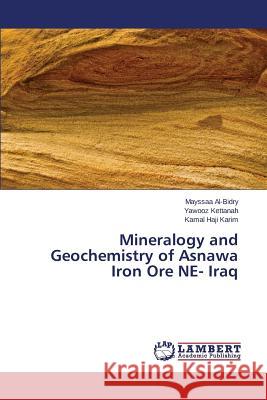Mineralogy and Geochemistry of Asnawa Iron Ore NE- Iraq » książka
Mineralogy and Geochemistry of Asnawa Iron Ore NE- Iraq
ISBN-13: 9783659794384 / Angielski / Miękka / 2015 / 252 str.
The Asnawa iron ore is located near the Iran-Iraq border. Country rocks are traversed by a large number of fractures and veins. The fractures represent as pathways for the migration of hydrothermal solutions.Magnetite exists as dense massive aggregates.Magnetite accompanies by gangue minerals, which consists mainly of hornblende and clinopyroxene. The interrelation between hornblende and magnetite suggests that hornblende is formed contemporaneously with magnetite or a little older.Geochemical analyses show that magnetite has a concentration of Fe2O3 ranging between (90.13- 92.93 %). Nickel, cobalt, copper, zinc and sulfer concentrations in iron ore rocks are higher than their contents in corresponding country rocks. Hydrothermal solutions which have deposited magnetite are rich in REE. This indicates that magnetite was deposited in the last stage of mineralization with hornblende. 40Ar/39Ar analyses show that hydrothermal magnesio-hastingsite separated from iron ore sample yielded distinguished plateau age of 40.8 0.6 Ma, while the age of the magnesio-hastingsite from country rocks samples is 37.5 0.8 Ma, suggesting that magnesio-hastingsite is deposited during the Eocene."
The Asnawa iron ore is located near the Iran-Iraq border. Country rocks are traversed by a large number of fractures and veins. The fractures represent as pathways for the migration of hydrothermal solutions.Magnetite exists as dense massive aggregates.Magnetite accompanies by gangue minerals, which consists mainly of hornblende and clinopyroxene. The interrelation between hornblende and magnetite suggests that hornblende is formed contemporaneously with magnetite or a little older.Geochemical analyses show that magnetite has a concentration of Fe2O3 ranging between (90.13- 92.93 %). Nickel, cobalt, copper, zinc and sulfer concentrations in iron ore rocks are higher than their contents in corresponding country rocks. Hydrothermal solutions which have deposited magnetite are rich in REE. This indicates that magnetite was deposited in the last stage of mineralization with hornblende. 40Ar/39Ar analyses show that hydrothermal magnesio-hastingsite separated from iron ore sample yielded distinguished plateau age of 40.8 ± 0.6 Ma, while the age of the magnesio-hastingsite from country rocks samples is 37.5 ± 0.8 Ma, suggesting that magnesio-hastingsite is deposited during the Eocene.











